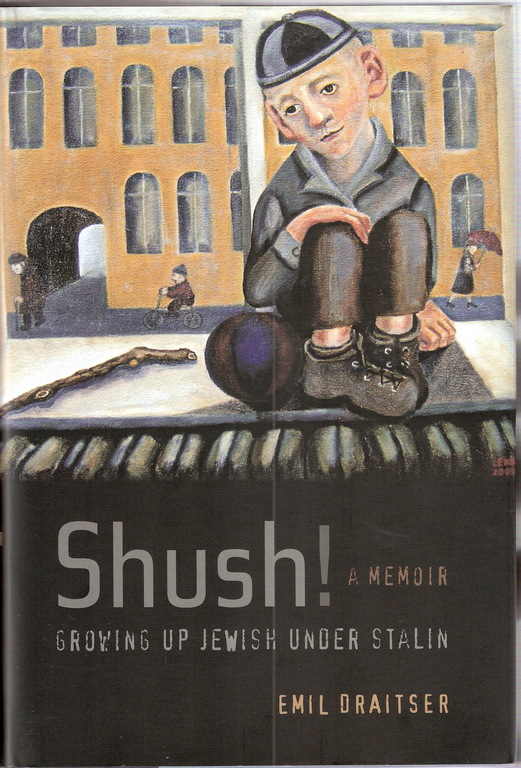The Kosher Bookworm — Chanukah book list 2
By Alan Jay Gerber
Issue of Dec. 19, 2008 / 22 Kislev 5769
With Chanukah just around the corner,I bring you three more books for your reading pleasure. Each one is of a distinct literary genre; however, each relates in its own way to the themes of the holiday –– freedom of religion and the defeat of tyranny.
The first book is an autobiography by Hunter College professor of Russian, Dr. Emil Draitser, entitled, “Shush!: Growing Up Jewish Under Stalin,” published by the University of California Press. While I intend to fully review this book more extensively in the near future, I bring it to your attention now because it gives the Chanukah theme a contemporary link that we often ignore.
This book deals with the author’s formative years, as a youth and teenager coping with a communist system and the rule of the cruel dictatorship of Joseph Stalin, in every way a modern day Antiochus IV Epiphanes. Just like Antiochus, Stalin sought at first to destroy the soul of the Jew, so as to forcibly assimilate Russian Jewry into the core social fabric of the workers’ paradise. It was only in his last years, as with Antiochus, that the Jewish people were to encounter a physical threat.
Draitser gives his book an unusual title, as he explained it to me, for a very unusual reason. Many years after he arrived on these blessed shores of America, Draitser discovered that every time he said the word Jewish, his voiced dropped. Others around him picked up on this unusual mannerism and it soon became an annoyance that attracted unwelcome attention. He finally came to the realization that this “habit” was the result of his having grown up in a communist society that was saturated with unadulterated anti-Semitism. Any mention of the word Jewish was met with the admonition –– SHUSH! He was always warned by older members of his family to avoid any and all public manifestations of Jewishness, including the use of Yiddish expressions and what I found the most galling, “don’t cry over your murdered relatives in the Holocaust.”
Draister’s entire childhood, under the great Stalin, was to be one great denial of Jewish religious and ethic identity. The specifics of this experience is what his book is all about. It is an eloquent testimony to a society and culture that had predated the author by over three centuries and was to be wiped out before his eyes within one generation. All the brutality and hypocrisy of communism plays out through his personal experiences, as he uses his sharp and eloquent pen as his weapon to retrieve the truth of a childhood that was wrenched from him. This story was only to end, in part, with the death of Stalin and his emigration to the United States.
His is a history written from the perspective of an on the ground experience, no false emotionalism here. This is a must-read for all of us so as to better appreciate the freedoms we have. The following will prove my point.
In a recent article entitled “Stalin’s Comeback” by Vasko Kohlmayer (from FrontlinePageMagazine.com) we learn of the efforts in modern day Russia, by Putin, to rehabilitate Stalin in the eyes of the Russian people. To Jews, this is an abomination.
One just has to be reminded of a simple fact: had it not been for Stalin’s signature to the Hitler-Stalin Pact in 1939, the Holocaust could not have been possible. It was under such a brute that Draitser spent his formative years and it was that political legacy that can be repeated today against which we must be on guard. If only for that, we should be thankful to Prof. Draitser for having written this book as a warning to us all.
My next Chanukah selection is entitled, “From The Maccabees To The Mishnah” by Dr. Shaye J.D. Cohen (Westminster John Knox Press, 2006).
This elegant and scholarly volume places the Chanukah story into sharp historical focus and gives great detail to all the events that not only led up to the first struggle in recorded history for religious freedom, but also explains the motivations of the relevant characters of their actions, both good and bad.
Cohen, a name familiar to scholars in our community, synthesizes religion, historical fact and literature that point to the interactions between Jews and non-Jews which serve as both the backdrop and the centerpiece of this historic period. Hellenistic culture is the focus of all that transpires here and Cohen is not shy in demonstrating the role that Hellenic culture plays in the development of our religious tradition, literature and language, something that is glossed over by those with other agendas.
This book is fully annotated and footnoted, with extensive sections for suggestions for further reading, broken down by subject and chapter, as well as a comprehensive index of all subject matter.
The last book under review is Chicago’s pre-eminent scholar Rabbi Yitzchak Sender’s “The Commentators’ Al Hanissim: Insights of the Sages on Chanukah” (Feldheim, 2000).
With all due respect to others, it is my opinion that this is the most comprehensive single volume dealing with the ritual observance of the Chanukah festival. Within the covers of this sefer are 335 pages of easily understood details concerning all facets dealing with candle lighting, at home, in shul and on the road, laws about with the required prayers, changes in the liturgy as governed by halacha and a comprehensive history of the festival based upon the Talmud and midrash.
Esoteric questions concerning the role of the shamash, for example, are given detailed narrative, as are the views of the Rambam on such matters dealing with the Chashmonaim, Al Hanissim, candle lighting and etiquette.
Among the other greats cited extensively in this sefer are Rav Shlomo Zalman Auerbach, Rav Yitzchok Hutner, Rav Joseph Soloveitchik, the Chofetz Chaim, the Vilna Gaon and the Chasam Sofer.
Also included are 15 stories highlighting the holiday’s observances through lessons in mussar, or the personal examples of the greats of previous generations.
I wish to conclude this review of Rav Sender’s sefer pointing out that this volume contains a 20-page chapter dealing with the laws of Hallel for this holiday. Please be aware that a full sefer is due out within the next week, iy”H, by Rav Sender dealing with all the facets of Hallel for all the yomim tovim as well as Chanukah. This 300-page sefer will contain new material never before published in English on this long ignored liturgical work. This sefer will also serve as a valuable intellectual contribution to the growing commentary on Tehillim, in which the Hallel service is included.
At this time the Kosher Bookworm would like to extend wishes for a happy, healthy, and joyous Chanukah. And, don’t forget to give seforim and Judaica books as Chanukah presents. They will be appreciated year round.

 48.0°,
Overcast
48.0°,
Overcast 







